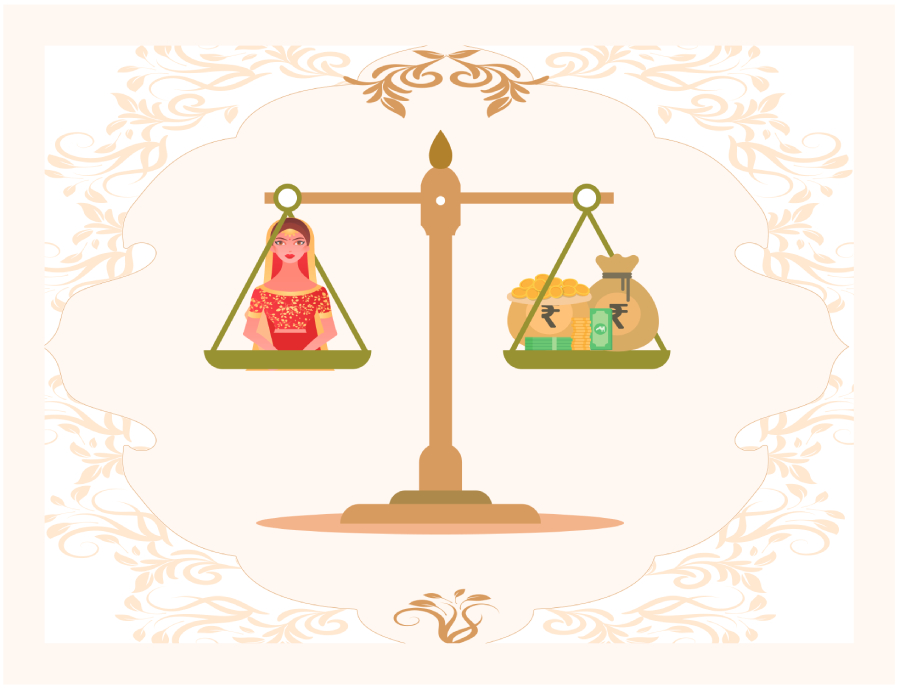Dowry deaths in Kerala: Evil persists despite high literacy & sex ratios

Data reveals that in the case of all IPC crimes, the conviction rate dropped from 42.9 pc in 2006 to 38.5 pc in 2012 (MIG Illustration)
The recent back-to-back deaths of three young brides in alleged dowry-related cases in Kerala has brought the attention back to this all pervasive social evil, despite the practice having been banned over 50 years ago. The cases have also brought to fore the possibility that the education and more balanced sex ratios may not necessarily lead to women empowerment in a proportionate manner as Kerala boasts of the highest literacy rates in India as well as one of the few states with more women than men.
Despite a favourable sex ratio, women in Kerala continue to struggle for equality as several incidents of harassment and domestic violence linked to dowry have been reported from the state.
While the recent cases all emerged from Kerala, the problem is much more severe in other parts of the country, especially in north India where dowry-related incidents are far higher.
“In the issue of dowry, my client was burnt alive, because she didn’t give dowry to the groom family, they offered. They asked her to give more dowry, or her husband would marry again to get more dowry. This was a critical situation for her, so she burnt herself as she had nobody that she could turn to for help,” says Manohar Lal Rastogi, an advocate based in New Delhi tells Media India Group. Rastogi refused to name his client for reasons of privacy of her family.
He goes on to say that the custom of dowry still exists in India that continues to be highly patriarchal society and where the parents of the bride are under immense pressure to spend way beyond their capacity. Many studies have indicated that marriage of a daughter is the single biggest expense incurred by most Indian families and often leads to significant indebtment. Yet, spending so much on dowry or weddings does not always ensure a happily married life for the bride as in many cases, she ends up living in misery or even dying, says Rastogi.
News reports about the recent deaths in Kerala suggest that at least in two of the three cases, a lot of dowry had been given by the brides, yet the groom’s families asked for more and allegedly used harassment to pressure the brides’ families, which eventually led to the two women taking their own lives.
As dowry has been banned by law, it is illegal to give as well as ask for dowry. However, Rastogi says that he has handled over 50 dowry-related cases and he feels that the families that give dowries are more responsible for the plight of the daughter.
“The recent back-to-back deaths because of dowry have disturbed me a lot, I have also seen several families and relatives separated, because of dowry issues and financial disputes,’’ says Ayisha Asheequa, a 22 year-old-student from Kerala.
She goes on to say that the main reason behind dowry-related incidents in Kerala reflect lack of empowerment of women, despite the state boasting of the highest literacy rates in the country. “Keralites are still obsessed with the picture of the bride, covered with gold from head to toe, they don’t understand it will not make them happy, all they need is an independent life, holding their head high with pride in her own independence and career,” says Asheequa.
“I think people should understand and invest money in educating their daughters and sons too, to make them capable of earning enough so that they will not depend on their marriage to be financially stable, rather than saving up for their marriages and let them be financially independent,” she adds.
Asheequa blames the continuation of the malpractice on poor implementation of the law, even if it is very stringent. A comparison of the conviction rate of all IPC crimes and the cases under 498A reveals that the conviction rate of the cases under 498A has continuously reduced. Data reveals that in the case of all IPC crimes, the conviction rate dropped from 42.9 pc in 2006 to 38.5 pc in 2012. However, between 2013 and 2018, the rate has increased continuously to reach 50 pc.
However, conviction under section 498A of IPC has drastically fallen from 21.9 pc in 2006 to 13 pc in 2018, meaning only 1 in 7 cases led to a conviction.
“The main reason behind persistence of this tradition despite many deaths, is that the laws are not strictly enforced. Once the punishments are promptly implemented, people will think twice before asking for dowry. The people who offer dowry is also equally responsible for this crime. Everyone should educate and make their children, sons or daughters, financially independent and teach them not to depend on their marriage to solve their financial problems,” she tells Media India Group.
“The idea of dowry is embedded in people’s minds, because the groom’s family raise their son expecting him to get a girl from a wealthy family, to get financial gains. Similarly, the families with daughters save their money to marry her off in a manner with tonnes of gold that will raise their prestige. Dowry is linked with the honour of both families. Thus, the tradition is hard to fade away,” she says.
Facing flak from activists and media, the Kerala government has initiated some more measures to curb this practice. A noted Gandhian organisation held a protest fast against dowry, while the state police launched a new campaign, “say no to dowry” and the chief minister created a 24hour helpline for victims of dowry harassments, domestic violence, and crimes against women.









